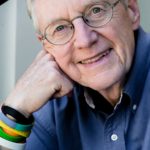My uncle moved in with us when I was 6 years old. He had returned from WWII and had been in a hospital in the USA before moving in with us. He had what they called “shell shock.” Today I think they might be using the term PTSD or trauma. I had heard why he moved in with when I was much older. He had been in D-Day, the invasion of Omaha Beach. But even in his 90’s he would never talk about this war experience. There are inner battles that continue even when the actual war is over.
It may have been Plato who wrote, “Be kind, for everyone you meet is fighting a hard battle.” Several years ago, I thought about this quote when I learned about the death of Robin Williams. Since attending a Christian service reflecting on his death and attending a mental health panel along with reading so many blogs and commentaries on his death, the quote makes even more sense. For some of us, at least for me, when such an untimely death happens and especially when the person has ended their life, I need to find some ways to understand, to find support, and to offer condolence, even if the battles were never mentioned out loud.
While many people are trying to explain why Robin ended his life, that line of inquiry does not seem very helpful. Was it depression, or bipolar disorder, or substance abuse, or financial difficulties, or the diagnosis of Parkinson’s disease? I think the only one who might be able to give a credible answer to “why” is Robin himself. Otherwise, we are stumbling in the dark trying to find some light.
When my younger brother ended his life, I truly did want to know why. He had been hospitalized for depression, he had a deeply blessed marriage, he was financially in good shape, he had a family that loved him, he had been given medication, and he was well respected in his field of work. I do not know why he died by suicide. Even though we read that up to 90% of the persons who do end their life have a diagnosable mental illness, the curtain is still closed on my understanding. That ought to make me stop trying to explain it, I guess.
Still, we do seek explanations, especially for a public person like Robin Williams or for me, my brother. Their deaths are a mirror to see how we ourselves are doing. How are things going for me? If not that great, perhaps there are steps I can take to benefit my body, my mind, and my spirit. Perhaps another outcome of this search is that all of us can pay more attention to issues that come to the surface as we explore. For instance, each of us can see it as a wake-up call to become even more aware of what mental illnesses/brain disorders are. We can seek to understand the devastation that comes from substance abuse. We can learn more about physically disabling illness. We can learn about and see the signs and symptoms of the great battles of such conditions with which people are living. This deepens our awareness with ourselves, as well as enriches our compassion towards those who live with them.
I am suggesting that we work within our faith communities to raise awareness about mental health and the stigma that surrounds mental illnesses. We can educate ourselves and our congregations through a variety of programs and resources which are website for the UCC Mental Health Network , NAMI, the Interfaith Network on Mental Illness, the Substance Abuse Mental Services Administration, and Mental Health Ministries. Our faith communities are containers of hope. As one person living with mental illness said, “Put as much hope in your bag as you can. Then you have that bag of hope when the hard times come."
When my family got around to figuring out what to say about how my brother died, we realized that we had to face it front on. People needed the truth. It was this quote that helped us. “Suicide is not chosen; it happens when pain exceeds resources for coping with pain.” I can barely imaging the pain that my brother was experiencing and perhaps what was happening for Robin Williams, too, when they ended their lives. I never actually knew the pain that my uncle has lived with all of his life. All that I know is that I need to be kind. Kind to everyone I meet. There are invisible battles that are being fought, and they are hard.

Rev. Alan Johnson
Alan Johnson is a mental health advocate who served on the national United Church Board of Homeland Ministries, 1979-1995, retired as chaplain at The Children’s Hospital, Denver, and is a past chair of the UCC Mental Health Network board of directors.
